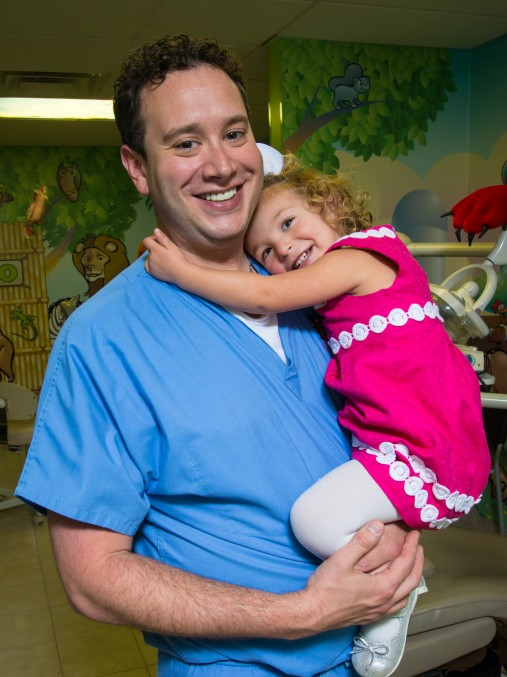
The relationship between sippy cups and dental health isn’t straightforward. While these training cups serve an important purpose in helping toddlers develop independence, they can also create conditions for tooth decay when used improperly. At ABC Children’s Dentistry, we help parents navigate these concerns with practical guidance tailored to each family’s needs. Our comprehensive approach to cleanings and prevention ensures your child develops healthy oral habits from an early age.
How Sippy Cups Can Impact Teeth
The main concern with sippy cups relates to prolonged exposure of teeth to liquids other than water. When children carry sippy cups filled with juice, milk, or other beverages throughout the day, their teeth remain bathed in sugar-containing liquids for extended periods. This constant exposure creates ideal conditions for bacteria that cause decay to thrive.
The design of sippy cups can compound this problem. Unlike regular cups, where liquid flows quickly into the mouth and is swallowed, sippy cups often deliver smaller amounts of liquid that pool around teeth. This pooling effect means teeth stay in contact with potentially harmful substances longer than they would during normal drinking.
When children sleep with sippy cups or use them for extended comfort periods, the situation becomes even more problematic. Plaque constantly forms on teeth, and sugar from beverages feeds the bacteria in this plaque, producing acids that attack tooth enamel and can form cavities over time.
Smart Sippy Cup Strategies
Water should be the primary liquid offered in sippy cups throughout the day. Unlike other beverages, water doesn’t feed decay-causing bacteria and actually helps rinse away food particles and acids that can harm teeth. Making water the default choice helps establish healthy hydration habits early.
When offering other beverages, timing matters significantly. Serving juice or milk with meals and snacks rather than as all-day drinks reduces the duration of sugar exposure. During meal times, increased saliva production helps neutralize acids and wash away sugars more effectively.
Consider using sippy cups only during specific periods rather than allowing all-day access. Transitioning to regular cups as soon as your child can manage them reduces prolonged liquid exposure and supports normal oral development.
Choosing the Right Sippy Cup
Not all sippy cups affect dental health equally. Cups with slow-flow spouts or those requiring sucking action tend to increase liquid contact time with teeth. Free-flow cups that deliver liquid more quickly may be better choices for dental health.
Avoiding cups with built-in straws can help reduce liquid pooling around teeth. When liquid flows directly into the mouth rather than being drawn slowly through a straw, teeth experience less prolonged exposure.
Some sippy cups are designed specifically with dental health in mind, featuring spouts positioned to direct liquid away from teeth or requiring less sucking action. While these features may help, the contents of the cup remain the most important factor for dental health.
Timing and Frequency Guidelines
Limit sippy cup use to specific times rather than allowing continuous access throughout the day. Structured meal and snack times with designated drink periods help minimize prolonged tooth exposure to potentially harmful liquids.
Evening and bedtime represent particularly high-risk periods for dental problems. Saliva production decreases during sleep, reducing the mouth’s natural ability to neutralize acids and wash away bacteria. Never allow children to sleep with sippy cups containing anything other than water.
After consuming sugary drinks, encourage children to rinse with water or transition to water-filled sippy cups. This simple step helps dilute residual sugars and acids before they can cause significant harm to developing teeth.
Transitioning Away from Sippy Cups
Most children can begin transitioning to regular cups around 12 to 18 months of age, though individual readiness varies. Starting this transition earlier rather than later supports both dental health and normal oral motor development.
Begin by offering water in regular cups during meal times when children are seated and focused. This supervised setting allows for spills while building confidence with traditional cups. Gradually expand regular cup use to other beverages and situations as skills develop.
Some children resist giving up sippy cups, especially if they’ve become comfort items. Understanding your child’s developmental needs helps create realistic timelines for transitions without creating unnecessary stress. If you have concerns about your child’s oral development or feeding habits, scheduling your child’s first visit allows our team to provide personalized guidance.
Signs of Sippy Cup-Related Problems
Watch for early signs of tooth decay, including white spots on teeth, brown or black areas, or visible holes in teeth. These changes often appear first on the front teeth, which receive the most exposure to liquids from sippy cups.
If your child begins showing sensitivity to hot or cold foods or complains of tooth pain, these symptoms may indicate developing problems related to frequent liquid exposure. Early intervention can prevent minor issues from becoming major dental concerns.
Changes in eating habits or reluctance to chew certain foods might also signal developing dental problems. Children naturally adapt to discomfort, so subtle behavioral changes shouldn’t be ignored. For parents dealing with multiple behavioral challenges, our guide on common kids’ dental issues provides comprehensive support for various situations.
Make an Informed Decision for Your Child
Dr. Singer and our team understand the challenges parents face in balancing convenience with health considerations. We work with families to develop practical strategies that support both child development and dental health.
If you have questions about your child’s sippy cup use or want to schedule a dental evaluation, contact our office at (856) 783-3515. At ABC Children’s Dentistry, we’re committed to helping families create positive dental experiences while maintaining optimal oral health throughout childhood and beyond.

